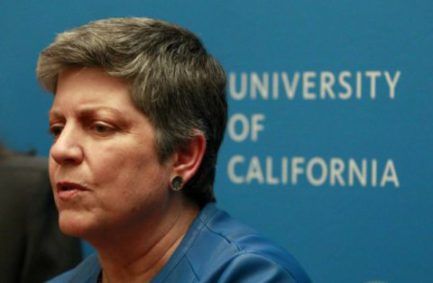UC tuition plan could ‘fall apart,’ regent warns
by Chris Reed | July 29, 2019 5:31 pm

University of California President Janet Napolitano and other top UC officials have proposed a new plan to manage tuition increases. But their plan runs the risk of backfiring because it depends heavily on consistent future support from the state Legislature and Gov. Gavin Newsom.
Under what’s known as cohort-based tuition, incoming students would be guaranteed that their tuition wouldn’t change for their first six years[1] at a UC campus. This would help students and their families avoid the big tuition hikes that led to protests[2] a decade ago during the recession. But it would also offer UC leaders the flexibility to increase tuition for incoming classes.
A staff report argued that this policy “could provide greater financial predictability for students, families and UC campuses while also improving UC affordability.” At the regents’ recent meeting in San Francisco, Nathan Brostrom, the UC system’s chief financial officer, called the concept “very, very promising,” according[3] to the Los Angeles Times.
Can Legislature’s support be counted on?
But as some regents pointed out, “cohort tuition” only works if state funding is stable or increasing. And while overall state revenue has increased eight straight years[4], that is a historical anomaly. Over a normal decade, revenue typically either declines or is flat for at least three years, due largely to the state’s reliance on volatile capital gains.
Unless UC can rely on Newsom and the Legislature to not lower funding under any circumstances, “this all falls apart,” said Cecilia Estolano[5], the Los Angeles lawyer and urban planner who is vice chair of the Board of Regents, according to the Times.
While the University of Illinois’ Urbana-Champaign campus has had cohort-based tuition since 2004, public universities in Georgia, Kansas and Oregon decided to end their programs in recent years after state funding cuts.
But regents have more to be nervous over than the chance a recession would cause budget headaches. While the Napolitano-Newsom relationship has no known tension, the UC president has many critics in the Legislature because of harsh audits since she took over in 2013. One issued in 2016 faulted[6] UC for dealing with tight budgets by choosing to sharply increase higher tuition-paying foreign and out-of-students by lowering admission standards – instead of undertaking any belt-tightening. Another published in 2017 detailed how Napolitano’s office had hidden[7] $175 million from the Legislature while requesting tuition hikes and showed that Napolitano’s top aides had interfered[8] with UC campuses’ evaluations of the performance of her office.
State law was rebuke aimed at Napolitano
That audit led to one of the Legislature’s harshest rebukes of a top state official in decades: the unanimous passage in late 2017 of a law[9] that makes it a crime punishable with a fine up to $5,000 for a state agency to interfere with, impede or obstruct an audit formally requested by state lawmakers. The audit also led the Bay Area News Group to call for Napolitano’s firing[10].
For the coming school year, UC will continue to charge in-state undergraduates $11,502 in annual tuition. Since Napolitano became UC president, undergraduate tuition has only gone up once. In 2017, regents approved[11] a $282 increase, or 2.5 percent.
Regents are expected to have further discussions about cohort tuition at their Sept. 18-19 meeting[12] at UCLA.
- their first six years: https://edsource.org/2019/uc-studies-ways-to-increase-tuition-but-with-a-price-freeze-guarantee/615134
- protests: http://www.cnn.com/2009/US/11/20/california.tuition.protests/
- according: https://www.latimes.com/california/story/2019-07-18/uc-tuition-increase-price-freeze-college-student
- eight straight years: https://www.statista.com/statistics/313176/california-state-government-revenue-and-expenditure/
- Cecilia Estolano: https://www.estolanolesar.com/cecilia
- faulted: https://www.latimes.com/local/lanow/la-me-ln-uc-audit-admissions-20160328-story.html
- hidden: https://www.nbcbayarea.com/news/local/University-of-California-Under-Fire-After-Audit-Reveals-175-Million-Hidden-in-Secret-Fund-420406393.html
- interfered: https://www.sfchronicle.com/bayarea/article/Report-says-UC-president-s-office-improperly-12358268.php
- law: https://www.latimes.com/local/lanow/la-me-ln-uc-audit-admissions-20160328-story.html
- Napolitano’s firing: https://www.mercurynews.com/2017/11/21/editorial-after-audit-debacle-fire-uc-president-napolitano/
- approved: https://dailybruin.com/2017/01/26/uc-board-of-regents-approves-2-5-percent-tuition-increase/
- Sept. 18-19 meeting: https://regents.universityofcalifornia.edu/meetings/
Source URL: https://calwatchdog.com/2019/07/29/uc-tuition-plan-could-fall-apart-regent-warns/